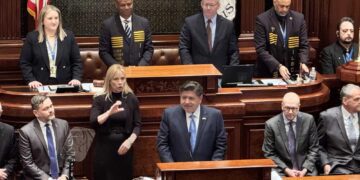CHICAGO – Wednesday, after heated debate, Illinois' most populated county passed an ordinance requiring profit and non-profit employers throughout the county to raise starting minimum wages to $10 per hour by July 1 of 2017 and increase $1 per year until $13 per hour in 2020.
And while proponents celebrated the passage, municipalities within the county suggested they will appeal opt-out of the minimum wage hike, just as they will do for the newly-required sick pay mandate, County Commissioner Tim Schneider told the board members.
Another opponent, Commissioner Sean Morrison told the board that in response to questions he asked the county's state's attorney office, they opined that the ordinance was not within the board's parameters.
"Our legal conclusion is that Cook County lacks the home rule authority to enact such an ordinance," the state's attorney wrote in an opinion on the ordinance.
However, supporting commissioners argued, the business community did not appeal the Chicago minimum wage hike, which suggests they will not argue with the Cook County Board's ordinance approval.
And if they do, the effort is worth the legal costs, one commissioner said.
Not only should the city of Chicago and Cook County have such an ordinance, so should the state of Illinois, other said.
"All 102 counties should be on the same playing field," Commissioner Bobbie Steele told his county colleagues. "We're trying to move forward."
The Board overwhelmingly passed the ordinance with 12 for, 3 opposed and 1 present.
Before the vote, Tonya Triche, Vice-President and General Counsel of the Illinois Retail Merchants Association laid out the issues stemming from federal, state and county mandates on employers.
She said that while serving on a committee that assessed the mandated Chicago minimum wage hike, employees said they hadn't seen much change in their wages because their hours had been cut, and employers said they had decreased hours.
The wage hike was added to a growing burden being placed on Chicago employers, making it more difficult than ever to meet the new requirement and serve their customers while keeping their businesses profit-making.
Triche told the Board in testimony before the vote:
The wage increase, coupled with the expenses related to the Affordable Care Act, had put them in the position to move a certain percentage of employees so that they now worked less than 30 hours on a consistent basis. An increase in the starting wage, plus a reduction in hours worked, equals the same or less money in an employee's check. It's simple math.
Let's take a look at the environment that a Cook County employer is running his or her business in today.
ACA mandates kick in January 1, new federal overtime regulations, the cost of which will mean many people who are salaried managers today will be moved to hourly positions – especially in the grocery sector – the recently passed sick leave and FMLA ordinance that was written in such a way that small businesses will have a hard time trying to afford the software its going to take to comply with that system. And now a starting wage ordinance that will increase wages to an unprecedented rate in a condensed time frame, according to a model for increases that is still yet unproven.
If this ordinance goes into effect, it will go into effect the same day as paid sick leave – exacerbating the cost and depression of hours worked as employers try to anticipate their losses in a very unstable legislative environment.
At least in Chicago, there was a two-year window between the implementation of the two ordinances. In part, it was an admission that these mandates do have a cost, and there will need to be a period of recovery. If the board passes this ordinance, it will be at the expense of that recovery, so that employers will cut deeper into hours and trim headcount much faster.
You are catapulting your small business owners into essentially an untested experiment on wage at an unprecedented level, on an unprecedented time frame, and expect that there not be any consequences. Suburban small business owners are really concerned about the level to which you are willing to experiment with their livelihoods and their ability to employ people in this county. We need restraint. And there needs to be some consideration given to their ability to adapt in the unstable environment that you are helping create.
We ask that you vote no.
A copy of the legal opinion was entered into the Board's record:
Download SA Opinion Minimum Wage Increase (2)
And the board discussion is worth a listen starting at 1:35:00







